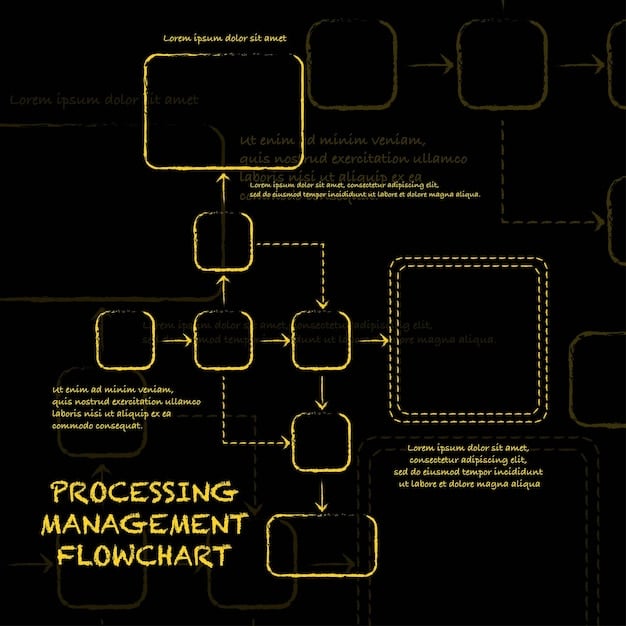New US Data Privacy Laws in 2025: Critical Changes for Businesses

New US Data Privacy Laws in 2025: 5 Critical Changes Businesses Must Implement Now encompass comprehensive data protection measures, including enhanced consumer rights, stricter data processing rules, and increased enforcement, compelling businesses to adapt their privacy practices to comply with these evolving regulations.
As New US Data Privacy Laws in 2025: 5 Critical Changes Businesses Must Implement Now loom on the horizon, are you ready to navigate the evolving landscape of data protection? Understanding these changes is crucial for maintaining compliance and protecting your organization’s reputation.
Understanding the Evolving Data Privacy Landscape in the US
The United States has seen a growing emphasis on data privacy, reflected in the development and enactment of various state-level privacy laws. As we approach 2025, it’s crucial to understand the broader context of data privacy within the US and how these laws are shaping business practices nationwide.

State-Level Privacy Laws Driving Change
Several states have already taken significant steps to protect consumer data privacy. California’s Consumer Privacy Act (CCPA) and its amendment, the California Privacy Rights Act (CPRA), have set a high standard for data protection. Other states, such as Virginia with its Consumer Data Protection Act (CDPA), have followed suit, creating a patchwork of regulations across the country.
- California Consumer Privacy Act (CCPA): Grants consumers the right to know, the right to delete, and the right to opt-out of the sale of their personal information.
- California Privacy Rights Act (CPRA): Amends and expands the CCPA, establishing a dedicated privacy enforcement agency and introducing new consumer rights.
- Virginia Consumer Data Protection Act (CDPA): Provides consumers with rights to access, correct, delete, and obtain a copy of their personal data, as well as the right to opt-out of processing for targeted advertising.
The Push for Federal Data Privacy Legislation
Recognizing the complexities of navigating a state-by-state regulatory landscape, there is increasing momentum for a comprehensive federal data privacy law. A federal law would provide a uniform standard for data protection, simplifying compliance for businesses operating across state lines and ensuring consistent protection for consumers nationwide.
Understanding the current state and federal efforts in data privacy is essential for businesses to anticipate and prepare for the changes that are coming in 2025.
1. Expanding Consumer Rights Under New Data Privacy Laws
One of the most significant shifts in the data privacy landscape is the expansion of consumer rights. These new rights empower individuals to control their personal information and hold businesses accountable for how they collect, use, and share data.
The Right to Access and Portability
The right to access allows consumers to request a copy of the personal information that a business holds about them. Data portability goes a step further, enabling individuals to transfer their data from one organization to another in a structured and machine-readable format.
The Right to Correction and Deletion
The right to correction gives consumers the ability to rectify inaccurate or incomplete personal information. The right to deletion, also known as the right to be forgotten, allows individuals to request the removal of their personal data from a business’s systems.
- Implement mechanisms for verifying consumer identities: Ensure that requests come from the actual individuals whose data is being sought.
- Establish clear processes for responding to requests within legal timeframes: Comply with deadlines for providing access, making corrections, or deleting data.
- Train employees on how to handle consumer rights requests: Equip your staff to properly address and fulfill these requests.
By understanding and implementing mechanisms to uphold these rights, businesses can build trust with consumers and ensure compliance with evolving data privacy laws.
2. Stricter Rules for Data Processing and Minimization
New data privacy laws are introducing stricter rules for how businesses process personal information. These rules emphasize the principles of data minimization, purpose limitation, and transparency.
Data Minimization and Purpose Limitation
Data minimization means that businesses should only collect and process the personal information that is strictly necessary for a specific purpose. Purpose limitation further restricts the use of data to the purpose for which it was originally collected, preventing businesses from repurposing data without consent.
Transparency and Consent Requirements
Transparency requires businesses to provide clear and understandable information about their data processing practices. Consent requirements mandate that businesses obtain explicit consent from consumers before collecting or using their personal information for certain purposes, such as marketing or targeted advertising.

- Conduct data audits to identify unnecessary data collection: Determine what data is truly essential and eliminate the rest.
- Update privacy policies to reflect data processing practices: Clearly communicate how data is collected, used, and protected.
- Implement consent management platforms: Obtain and manage consumer consent for data processing activities.
Adhering to these requirements can help businesses build stronger relationships with customers, protect personal data, and avoid potential fines and legal liabilities.
3. Enhanced Security Requirements for Personal Data
Data security is a cornerstone of modern privacy laws. The forthcoming regulations in 2025 are expected to mandate more robust security measures to protect personal data from unauthorized access, use, or disclosure.
Implementing Reasonable Security Measures
Businesses will be required to implement and maintain reasonable security measures appropriate to the sensitivity of the personal information they handle. This includes technical safeguards, such as encryption and access controls, as well as organizational measures, such as employee training and data security policies.
Data Breach Notification Requirements
Data breach notification laws require businesses to promptly notify affected individuals and regulatory authorities in the event of a data breach. These laws typically specify timeframes for notification and the content that must be included in the notification.
Regular Security Assessments and Audits
Conduct regular security assessments to identify vulnerabilities and ensure that security measures are effective. Periodic security audits can help verify compliance with data security standards and regulations.
Businesses need to invest in robust security measures and incident response plans to protect personal data and minimize the impact of potential data breaches.
4. Increased Enforcement and Penalties for Non-Compliance
Data privacy laws are becoming more robust, and along with them comes increased enforcement and stricter penalties for non-compliance. As these laws evolve, businesses must be vigilant in their efforts to comply or face significant consequences.
The Role of Regulatory Authorities
Regulatory authorities, such as the Federal Trade Commission (FTC) and state attorneys general, play a crucial role in enforcing data privacy laws. These agencies have the power to investigate alleged violations, issue fines, and seek injunctive relief to stop unlawful practices.
Types of Penalties for Non-Compliance
The penalties for non-compliance with data privacy laws can include monetary fines, civil lawsuits, and reputational damage. Fines can range from thousands to millions of dollars, depending on the severity and scope of the violation.
- Stay informed about changes in data privacy laws: Monitor regulatory developments and seek legal advice to ensure compliance.
- Implement a compliance program: Establish policies, procedures, and training programs to ensure that employees understand and adhere to data privacy requirements.
- Conduct regular audits to assess compliance: Identify and address any gaps in compliance efforts.
By prioritizing compliance and taking proactive measures, businesses can mitigate the risk of enforcement actions and maintain their reputation as responsible data stewards.
5. The Impact on International Data Transfers
With the globalization of business, international data transfers have become increasingly common. However, data privacy laws impose restrictions on the transfer of personal data across borders to ensure that it remains protected regardless of where it is processed.
Cross-Border Data Transfer Mechanisms
Data privacy laws often require businesses to implement specific mechanisms to ensure that personal data is adequately protected when transferred to countries with different data protection standards. These mechanisms can include standard contractual clauses (SCCs), binding corporate rules (BCRs), and adequacy decisions.
Compliance with International Standards
Businesses operating globally must comply with international data protection standards, such as the General Data Protection Regulation (GDPR) in Europe, as well as the data privacy laws of the countries where they conduct business.
- Map data flows to identify international data transfers: Understand where personal data is being transferred and processed.
- Implement appropriate data transfer mechanisms: Ensure that data transfers are compliant with applicable data privacy laws.
- Monitor changes in international data protection laws: Stay informed about new regulations and adapt data transfer practices accordingly.
Navigating the complexities of international data transfers requires careful planning and adherence to data privacy laws.
| Key Point | Brief Description |
|---|---|
| 🔑 Consumer Rights | Expanded rights to access, correct, and delete personal data. |
| 🛡️ Data Security | Mandatory robust security measures to protect personal data. |
| ⚖️ Enforcement | Increased enforcement and stricter penalties for non-compliance. |
| 🌐 Data Transfers | Stricter rules for international data transfers. |
FAQ
▼
Key consumer rights include the right to access, correct, delete, and port their personal data. They also have the right to opt out of the sale or sharing of their data for targeted advertising.
▼
Data minimization requires businesses to only collect and process data that is strictly necessary for a specified purpose. This limits the amount of data they can collect and retain.
▼
Businesses must implement reasonable security measures, including technical safeguards like encryption and access controls, and organizational measures like employee training and data security policies.
▼
Penalties for non-compliance can include monetary fines, civil lawsuits, and reputational damage. The specific amount of fines varies depending on the severity and scope of the violation.
▼
The new laws impose restrictions on international data transfers to ensure that personal data is protected regardless of where it is processed. Businesses must use mechanisms like SCCs or BCRs.
Conclusion
As the US data privacy landscape continues to evolve, businesses must proactively adapt to these changes. By understanding and implementing the five critical changes outlined—expanding consumer rights, stricter data processing rules, enhanced data security requirements, increased enforcement, and the impact on international data transfers—organizations can better protect personal data, maintain compliance, and foster trust with their customers. Staying informed and taking proactive steps is essential for navigating the complexities of these evolving regulations.





